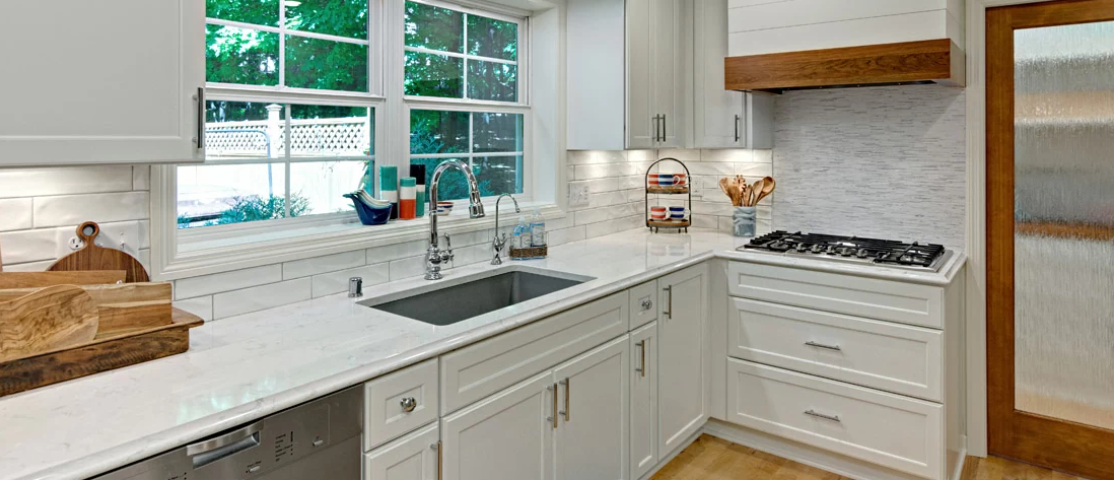
The Art Of Renewal: Transformative Home Renovation Ideas For Every Space
November 15, 2023
Greenovation: Eco-Friendly Kitchen Remodeling Ideas For A Sustainable Home
November 15, 2023As the global community grows increasingly aware of the environmental impact of human activities, there has been a marked shift toward more sustainable practices in various aspects of life.
One such area that presents significant opportunities for eco-conscious adjustments is kitchen remodeling.
The modern kitchen, often considered the heart of a home, consumes substantial amounts of energy and resources on a daily basis.
Therefore, incorporating environmentally friendly elements during renovation not only contributes significantly to reducing one’s carbon footprint but also results in potential savings on utility bills.
The initial step in transitioning towards an eco-friendly kitchen involves selecting appliances designed with energy efficiency at their core.
Such devices are engineered to operate using minimal electricity or gas without compromising their performance levels, thereby offering homeowners dual benefits: lower utility costs and reduced environmental impact.
Concurrently, it is equally important to consider utilizing sustainable building materials for the renovation process.
This includes everything from cabinets and countertops to flooring and backsplash tiles – each component contributing individually yet cumulatively towards achieving a ‘Green Cuisine’.
Ultimately, this comprehensive approach leads to the creation of kitchens that are not only aesthetically pleasing but also responsible and respectful towards our shared environment.
Selecting Energy-Efficient Appliances
What could be more crucial in a green kitchen remodel than incorporating energy-efficient appliances?
These types of appliances, also known as Energy Star-rated appliances, not only consume less electricity but also contribute significantly to reducing greenhouse gas emissions.
Important attributes to consider when choosing these appliances include their power consumption rate and efficiency levels. For instance, an energy-efficient refrigerator can use approximately 15% less energy than non-certified models.
Similarly, dishwashers with the Energy Star rating are 12% more energy efficient on average compared to standard models.
Moreover, opting for induction cooktops over traditional electric or gas stoves is a wise decision from an environmental standpoint.
Induction cooktops use electromagnetic fields to heat pots directly, resulting in reduced heat loss and hence lower energy consumption.
The incorporation of such devices into kitchen design can lead to substantial long-term savings on utility bills while contributing positively towards environmental sustainability goals.
Therefore, selecting energy-efficient appliances emerges as a fundamental step in creating eco-friendly kitchens that align with the shared objective of preserving our planet for future generations.
Choosing Sustainable Materials for Your Renovation
Selecting sustainable materials for a renovation project can dramatically reduce the environmental impact of the endeavor, while simultaneously creating a visually appealing and functionally efficient space.
In particular, recycled or reclaimed wood is an outstanding choice; it provides both aesthetic appeal and eco-friendly credentials.
Furthermore, sustainable natural stone such as locally-sourced granite or marble offers longevity and durability without contributing to excessive carbon emissions associated with transportation.
While selecting materials that are inherently sustainable is crucial, another key area to consider includes how those materials are treated:
– Natural Treatments:
– Sealants: When choosing sealants for woods or stones, opt for low-VOC (Volatile Organic Compounds) versions which release fewer toxic solvents into the environment.
– Finishes: Similarly, select finishes made from natural oils like linseed or tung oil which not only enhance the natural beauty of your material but are also less harmful to the environment.
– Sustainable Production Methods:
– Energy-efficient manufacturing: Prioritize manufacturers who utilize energy-efficient methods in their production processes. This helps decrease the overall carbon footprint.
– Ethical sourcing: Ensure that your chosen materials have been ethically sourced. This means they should come from renewable resources and cause minimal harm to biodiversity.
By making these thoughtful choices when selecting and treating remodeling materials, homeowners can craft spaces that not only embody their personal style but also reflect their commitment to environmental stewardship.




